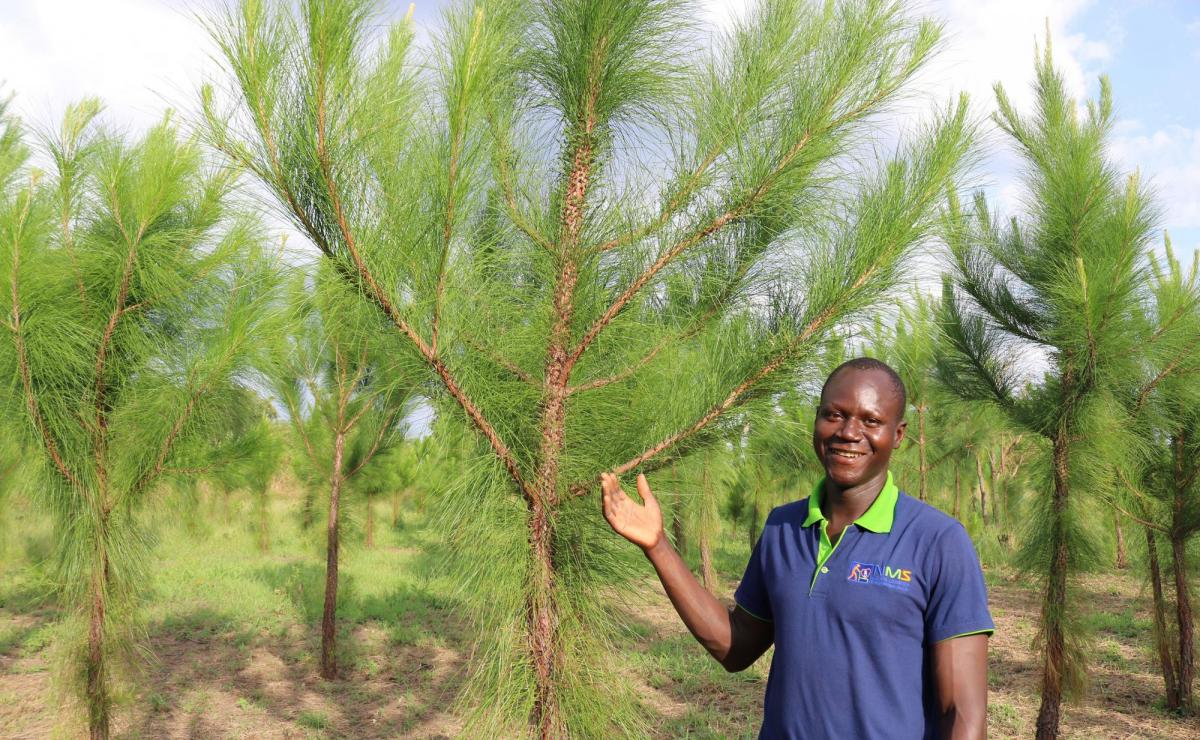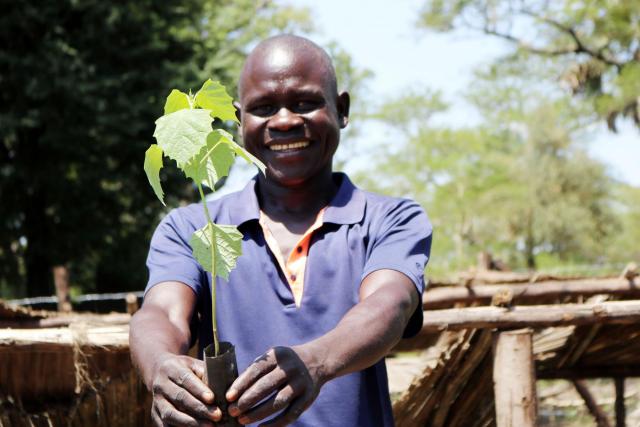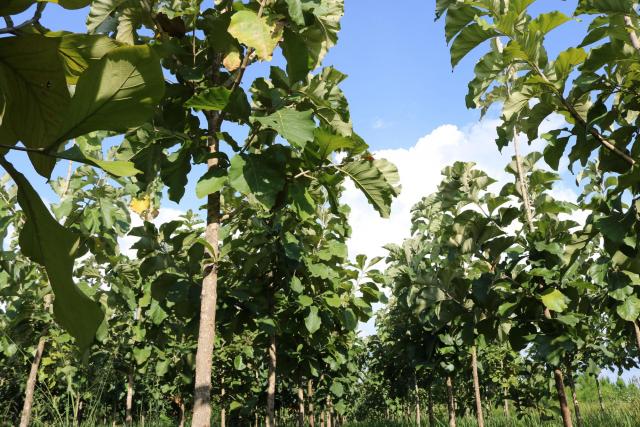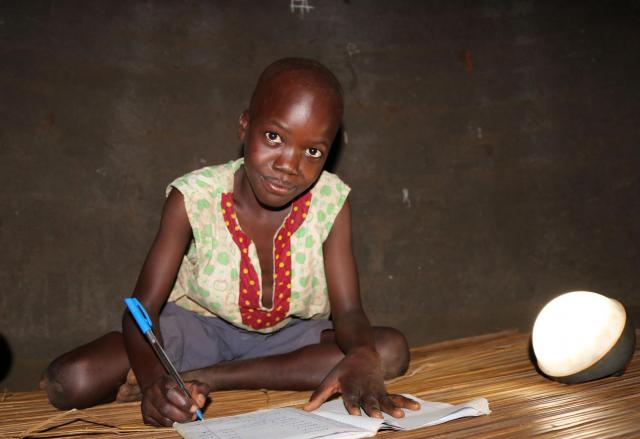The people of Northern Uganda uphold Environmental Conservation

The world loses an average of 18.7 million acres of vegetation per year according to the World Wildlife Fund (WWF). This is due to the increasing pressure on the environment and land to accommodate the growing population as well as livelihood activities that require natural resources like timber and fuel wood.
Due to environmental degradation, the world is facing the biggest effects of climate change our generation has ever seen. Hurricanes, floods, prolonged droughts, global warming and the loss of biodiversity have become rampant, hence, loss of life among the flora and fauna, displacement of people, and destruction of infrastructure and sectors of the economy.
To prevent environmental degradation and avert the effects of climate change, the Lutheran World Federation (LWF) with funds from the European Union and Church of Sweden is implementing a 5-year project in Northern Uganda aimed at environment conservation and restoration.
Through the Teko Wa project, LWF sensitizes populaces in Lamwo, Kitgum, Pader and Agogo districts about environmental conservation and the dangers of environmental degradation; Offers people tree seedlings for planting to restore the lost vegetation; Provides solar systems and influences masses to use solar which is a clean, natural, renewable energy. LWF also influences its target audiences to use energy saving stoves and briquettes to prevent tree cutting for fuel, trains stove artisans to create employment opportunities and thus prevent bush burning for hunting. LWF also advocates for bylaws aimed at conserving the environment.

Afforestation for environment protection and income
To restore the lost vegetation, LWF offers people tree seedlings for planting, helps some establish tree nurseries and also ensures that trees especially those that belong to the endangered species are marked to avoid their careless cutting and extinction. To date, 2653.4 hectares of woodlots have been established by people in Northern Uganda with support from LWF.
James Olanya is a 37-year-old tree farmer in Ayella village, Lamwo district who ventured in tree farming in 2016 after receiving 3000 Teak tree seedlings from LWF. With the seedlings, Olanya established a 6-acre woodlot. “My land was dormant and I thought it wise to plant trees not only to conserve the environment but, to also make a long term investment from which I can earn money to cater for my children’s university tuition fees.”

Stephen Candano is another proud tree farmer who established a Pine tree woodlot in Lamwo district. While he waits to sell his trees, Candano is already reaping from his 3 are tree farm as he intercrops and plants food crops for food and income. “While other people’s crop dry due to the long droughts, mine thrive and I get huge harvests that I take home for food and sell off the rest to the people in my community.” Candano attributes his big harvests to the shade from the trees, the moisture they preserve in the soil and the fact that they prevent soil nutrients from being eroded away by running water during rainy seasons.
Trees play vital roles in environment conservation as they prevent accumulation of greenhouse gases responsible for global warming in the atmosphere and supply oxygen to all living creatures hence sustaining life on earth. Richard Komakech, the Lamwo District Natural Resources Officer explains that trees stabilize the soil and prevent erosion, they break the intensity of wind and floods hence protecting both the built and natural environment from destruction. “Trees create habitats for wildlife, they protect watersheds from erosion and eutrophication through stabilizing the upstream areas. Trees emit vapor which is responsible for forming rainfall.”

Use of solar, a clean and renewable energy
Night fires remain an option for lighting in remote places. This results in to air pollution and tree cutting as the fires require large amounts of fuel wood. To avert these, LWF not only sensitizes the masses in Northern Uganda about the dangers of night fires to the environment and their health. LWF also influences the masses to use clean energy for lighting by offering them solar systems and lanterns at subsidized prices.
Alex Eobuka is a father to 4 in Cinkul village, Lamwo district. His family depended on night fires for lighting before they acquired a solar lantern from LWF. “My children would collect firewood from nearby shrubs that we would use for lighting through the night.” Eobuka explains that the night fire was risky to his family especially the children as it would produce a lot of smoke which would not only affect their respiratory systems but, eyes too. “We would cough endlessly, sneeze soot and wake up with red eyes.”
This was the case until the family acquired an almost free lantern as they only paid UGX 24,000 and the rest of the cost – UGX 71,000 was paid by LWF. A grinning Eobuka describes a better life with their new solar lantern. “My children are safe as they don’t have to fetch for firewood every evening, their health is better with less smoke and their school grades have greatly improved as they get to revise their books at night.”

Rashal Owaci used a small paraffin lantern before acquiring a solar lantern. He explains that night lighting was so expensive as he had to spend UGX 1,000 on paraffin every day. Owaci however adds that he doesn’t spend money on lighting anymore as all he has to do is charge his solar system during the day and use it for lighting at night. Owaci diverts the money in to his artwork business from which he earns at least UGX 200,000 a month. “With my solar lantern, I sketch and paint art pieces at night and do odd jobs like building during the day to increase my income.”
25,000 people have received solar systems at subsidized prices from Barefoot in partnership with LWF, 35,000 more are yet to receive before the end of December 2018. While all the beneficiaries are enjoying clean lighting, hundreds have established income generating activities like salons and phone charging outlets.

Energy saving stoves for environment protection and income
People are advised to drop the environment unfriendly three stone open stove for the energy saving stove which is environment friendly; its smoke free, requires less fuel and is sustainable. Target audiences are thus trained by LWF on how to make energy saving stoves for both household and commercial use.
Paul Okema an energy saving stove user in Pader district describes the stove “Its smoke free which protects us from eye and respiratory infections, it also uses little charcoal compared to the bundles of firewood required by the three stone open stove.”
Neftali Mugizi, the Teko Wa Project Officer explains that energy saving stoves reduce the need for cooking firewood by up to 75% as compared to that required by the three stone open stove predominantly used in Northern Uganda. “This helps to reduce tree cutting for firewood, makes homes healthier with less smoke, and also prevents women and girls from the dangers of potential rape and attacks while out to collect firewood.” Mugizi adds that since girls and women don’t have to go out looking for firewood, they get more time for their education and to engage in livelihood activities.
Other than that, the local stove artisans earn a living from making and selling energy saving stoves. Raymond Kalokwera is one of the hundreds that have been trained by LWF on how to make energy savings stoves. Together with his business partner Stephen Okot, they have made and sold hundreds of stoves to the local communities in Pader, Kitgum and Lamwo districts. “We sell the stoves between UGX 15,000 and 42,000, we have made sales of over UGX 30 million and continue to earn more.” Okot adds saying that the income has improved their lifestyle.
LWF's Environmental Conservation activities in Northern Uganda are funded by the European Union and Church of Sweden.

